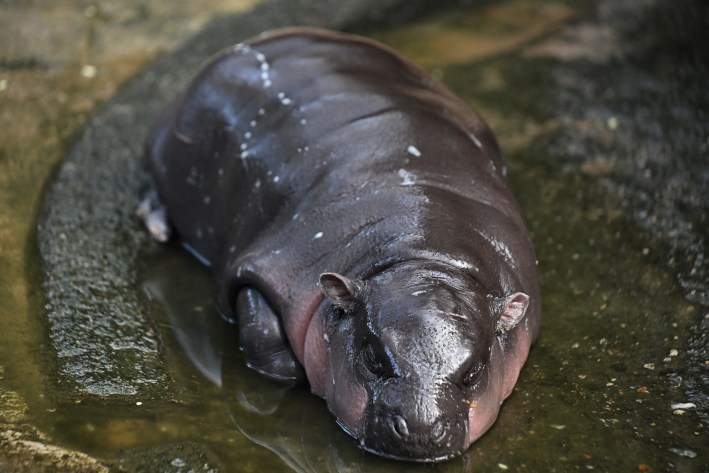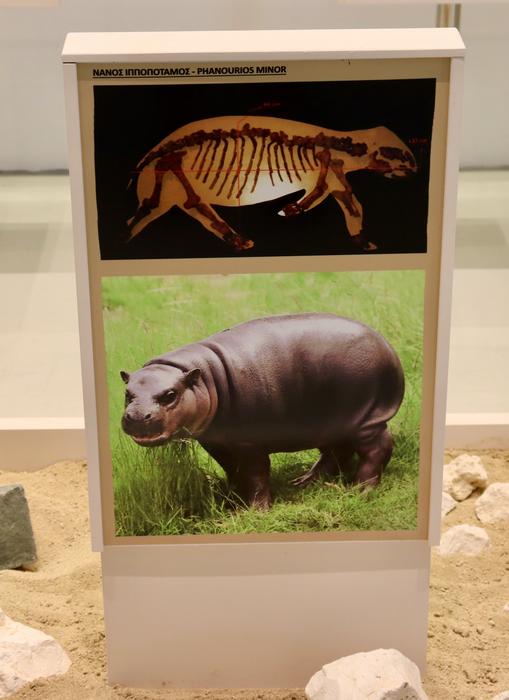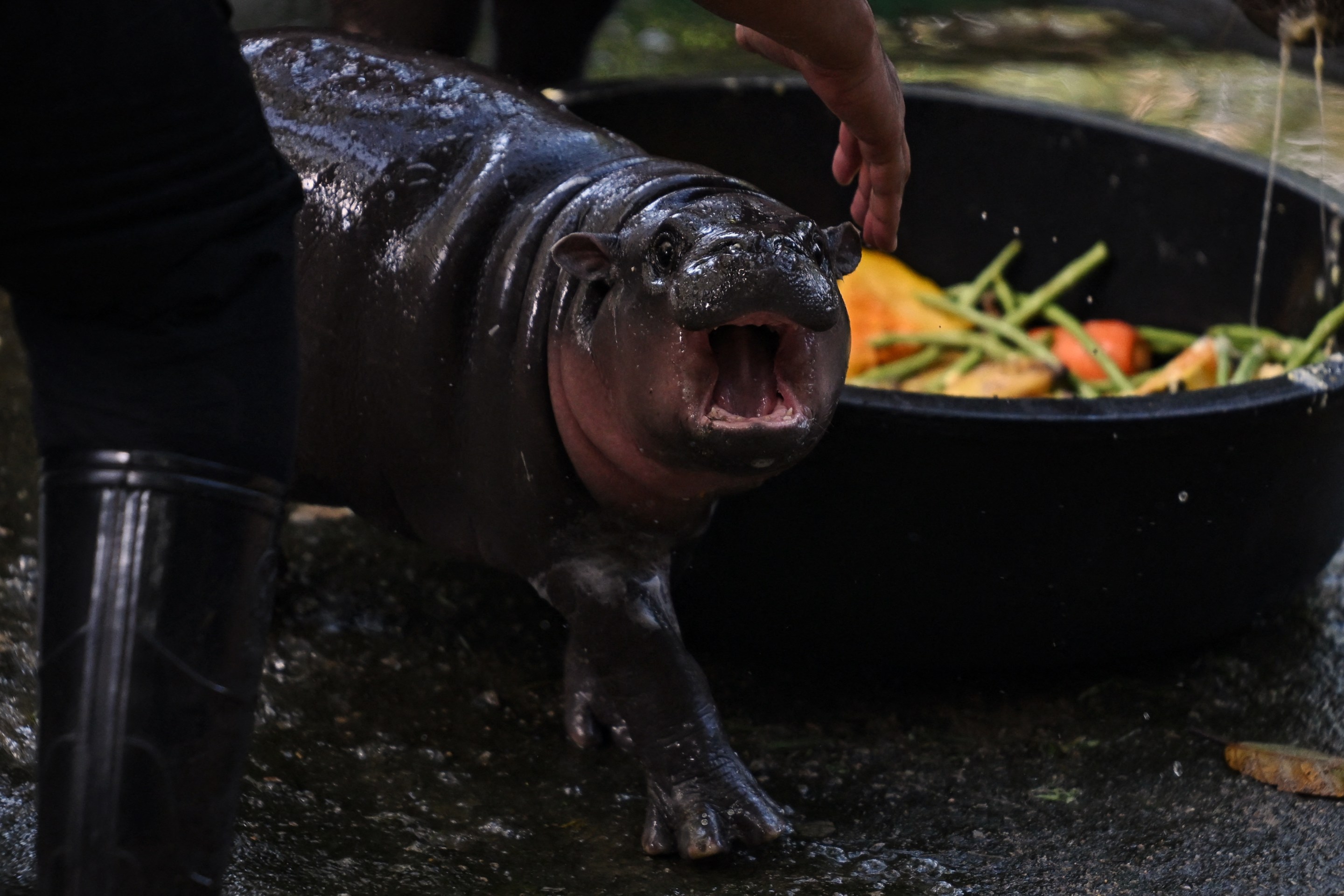The name on everybody's lips is Moo Deng, the baby pygmy hippo at the Khao Kheow Open Zoo in Chonburi, Thailand. Moo Deng is two months old and looks like a glossy purple jelly bean and carries herself with the furious spirit of someone who never asked to be born. In her most famous photos, Moo Deng can be seen screaming. If Moo Deng is not screaming, she is probably biting or sleeping. She is very busy!
Pygmy hippopotamuses are a tenth the size of common hippos but can still weigh up to 600 pounds, so a bite from an adult would spell disaster for its human victim. But Moo Deng is a baby, so when she tries to bite a zookeeper for washing her with a hose, it is still funny and not tragic. Just look inside her gummy pink mouth; until recently, she didn't have any teeth! Her babyhood makes her puckish, and like icons before her, Moo Deng refuses to be in a situation for even an hour where she is not enjoying herself. When a zookeeper tries to pick Moo Deng up, she slips free of this grasp as easily as a buttered pig. Moo Deng obeys no masters. No kings. No laws. No God.
Moo Deng's meteoric rise to fame this late summer is mirrored only by Chappell Roan's. Both divas have experienced harassment from their legions of fans. Some of Moo Deng's fans have poured water on her to wake her up, or thrown food at her to attract her attention. Moo Deng, who lives in a zoo, cannot retreat from the paparazzi as easily as Roan can, and the zoo recently installed CCTV cameras around the hippo's enclosure and limited the amount of time visitors can spend by Moo Deng, according to NPR. But even people and institutions oceans away from the zoo have found meaningful connection with Moo Deng, perhaps as they once did with Fiona, another child-star hippopotamus who lost her spotlight when she lost her baby face and weathered a scandal involving an affair with her stepfather—must all girl hippos be perfect to be deserving of love?
For now, Moo Deng is the hippo of the moment—unflappably cool, perpetually moist, and thoroughly uninterested in what you think.

On Wednesday, rather serendipitously, a group of scientists published a paper in Proceedings of the Royal Society B about the extinction of an ancient, tiny hippo: the dwarf hippopotamus Phanourious minor, which roamed the island of Cyprus tens of thousands of years ago. Cyprus was once home to two relatively tiny giants, the dwarf hippo, which could reach 286 pounds, and the dwarf elephant Palaeoloxodon cypriote, which could top 1,100 pounds. But both the hippo and elephant vanished when humans arrived about 14,000 years ago. The researchers found the reason for their extinction—which you may have already guessed, and for which I am glad Moo Deng is too far away to hear—was that the human settlers likely hunted and ate these species to death.
Today, the only two living species of hippos are the common hippopotamus (like Fiona) and the pygmy hippopotamus (like Moo Deng and her siblings Moo Wan and Moo Tun, and her parents, Jonah and Tony.) The dwarf hippopotamus was less than a tenth of the size of a common hippo, about the size of a boar (and the dwarf elephant was approximately the size of a horse.) But the common hippo was still the dwarf hippo's closest relative, as the two diverged about one-and-a-half million years ago. Researchers suspect the hippo and elephant both arrived to Cyprus by crossing the Mediterranean, perhaps after a storm.
When the polymath Eratosthenes visited Cyprus in the third century B.C., he reported that the island was "thickly overgrown with forests." Cypress, juniper, and oak grew across the island, along with bay laurel and olive trees. Before humans arrived, the 3,572-square-mile island belonged to its tiny elephants and hippos. Both had shrunk over the years in a process known as island dwarfism, which has nothing to do with the condition of achondroplasia, but rather an evolutionary pattern in which the body sizes of larger species on an island shrink over time. Scientists suspect this trend occurs when a large species has no predators, allowing it to decrease its body size without any sacrifices to survival. The phenomenon may also be influenced by the limited amount of food resources on an island.

Although scholars in the past have argued that Cyprus's first human settlers were too few to drive both the dwarf elephant and dwarf hippo to extinction, the authors of the new paper argue that the population of people would have grown quickly enough to drive both species to extinction within just 1,000 years. "The main determinant of extinction risk for both species was the proportion of edible meat they provided to the first people on the island," Corey Bradshaw, a global ecologist at Flinders University in Adelaide and an author on the paper, said in a statement.
None of these early settlers left behind photorealistic sketches of the dwarf hippos, and scientists have only skeletons. So no one knows exactly what the dwarf hippos of Cyprus looked like in their heyday, as adults or as babies. But my own (rather unscientific) conclusion is that the dwarf hippopotamus simply was not as cute as a pygmy hippopotamus. Although Moo Deng's name means "bouncy pig" or "pork patty," surely none of her fans would ever dream of eating her. She is the platonic ideal of a baby, and, to some, the platonic ideal of beauty. If the hungriest hunter-gatherer, upon wandering the olive groves of Cyprus, were to encounter the face of a hippo like Moo Deng, they would not be able to kill such a baby. They would have fallen to their knees and anointed Moo Deng a god. To everyone who has pledged to die for Moo Deng, she appreciates your sacrifice. It will only make her stronger, and bitier.






